Kia Niro VS Suzuki Vitara
In the ever-growing compact SUV market, the Kia Niro and Suzuki Vitara stand out with their distinct offerings. The Niro impresses with its hybrid efficiency and spacious interior, making it a practical choice for eco-conscious buyers. In contrast, the Suzuki Vitara delivers a more rugged appeal, showcasing off-road capability and a robust design, catering to adventure seekers.
Kia Niro
The Kia Niro presents itself as a versatile and eco-friendly SUV, blending a stylish design with advanced hybrid technology. Its spacious interior offers comfort and practicality, making it ideal for both city driving and longer journeys. With a focus on efficiency and sustainability, the Niro is a compelling choice for environmentally conscious drivers.
detailsSuzuki Vitara
The Suzuki Vitara impresses with its compact design and robust stance, making it ideal for both urban and off-road adventures. Its sleek lines and modern aesthetics ensure it stands out on the road, complemented by a comfortable and high-tech interior. The Vitara offers a smooth and engaging driving experience, combining efficiency with practicality.
detailsThe automotive market is always abuzz with exciting new models that push the boundaries of technology and design. In this article, we will delve into a detailed comparison of two notable contenders in the compact SUV segment: the Kia Niro and the Suzuki Vitara. Both vehicles come loaded with innovations, excellent features, and distinct specifications that cater to various consumer needs.
Engine Performance and Efficiency
Starting with the Kia Niro, this versatile SUV is offered with two engine types: Full Hybrid and Plugin Hybrid. The Niro's power figures stand at 129 HP for the full hybrid and an impressive 171 HP for the plugin variant, delivering optimal performance combined with impressive fuel efficiency. The vehicle boasts a fuel consumption rate of just 4.4 L/100km and features a CO2 emission rating that ranges between 19 to 100 g/km, making it one of the more eco-friendly options in the market.
On the other side, the Suzuki Vitara brings a mix of petrol MHEV and Full Hybrid engines to the table. With the power output reaching up to 129 HP, it competes closely with the Niro. The Vitara's fuel consumption ranges from 5.0 to 5.6 L/100km, which is slightly higher than that of the Niro. However, its CO2 efficiency class rates are slightly lower, spanning between 113 to 129 g/km, positioning it in a different eco-friendly category.
Transmission and Drive Options
The Kia Niro primarily employs an automatic dual-clutch transmission, which enhances its driving experience with smooth gear changes. With front-wheel drive as its standard configuration, the Niro emphasizes ease of handling and efficiency.
Conversely, the Suzuki Vitara offers greater versatility. It provides both manual and automated manual transmission options, and importantly, it gives consumers the choice of front-wheel or all-wheel drive systems. This flexibility allows the Vitara to appeal to a broader audience, especially those who may require enhanced traction for diverse driving conditions.
Dimensions and Cargo Space
In terms of size, the Kia Niro measures 4420 mm in length, 1825 mm in width, and 1545 mm in height, providing it with a spacious interior and a trunk capacity of 451 liters. This makes it a practical option for families or anyone needing extra cargo space.
The Suzuki Vitara is slightly smaller, coming in at 4185 mm long, 1775 mm wide, and 1595 mm high. While it has a commendable trunk capacity of up to 375 liters, it doesn't quite match the Niro's offerings. However, its compact measurements may benefit those who prefer a more maneuverable vehicle in urban settings.
Technological Features and Innovations
When it comes to tech, the Kia Niro is known for its state-of-the-art infotainment system along with advanced safety features like lane keeping assist and adaptive cruise control. Further enhancements include options for smartphone integration and numerous driver-assist technologies that elevate its status as a modern SUV.
The Suzuki Vitara also offers a suite of technological features, including a user-friendly infotainment interface, smartphone connectivity, and a range of safety systems. However, it may not be as comprehensive as those found in the Niro but still provides sufficient options for tech-savvy consumers.
Conclusion: Choosing the Right Compact SUV
Both the Kia Niro and Suzuki Vitara boast their distinct advantages, making them solid contenders in the compact SUV segment. The Kia Niro excels in eco-friendliness, cargo space, and advanced technology, while the Suzuki Vitara offers versatility in drivetrain options and a slightly more dynamic driving experience.
Your choice ultimately boils down to your personal preferences and requirements. If you prioritize sustainability and modern amenities, the Kia Niro may be the best fit for you. Alternatively, if you seek an adaptable and slightly sportier SUV, the Suzuki Vitara is worth considering. Regardless of your choice, both vehicles are designed to meet the evolving demands of today’s drivers.
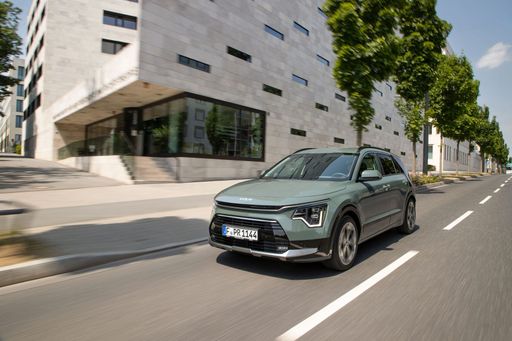 @ press.kia.com
@ press.kia.com
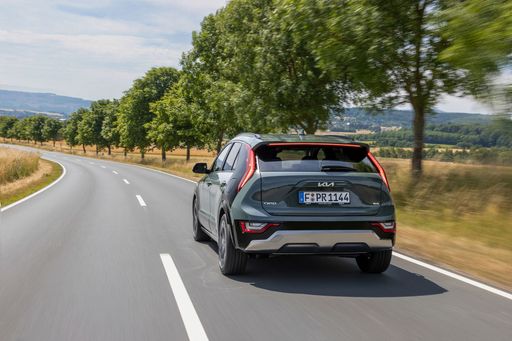 @ press.kia.com
@ press.kia.com
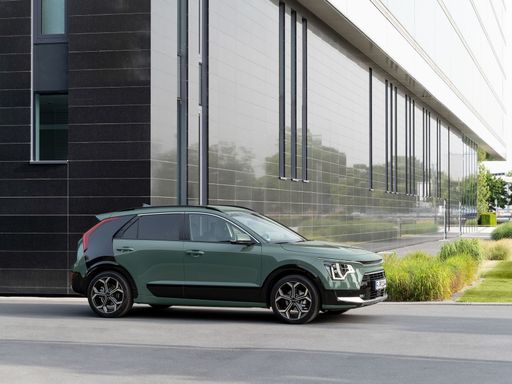 @ press.kia.com
@ press.kia.com
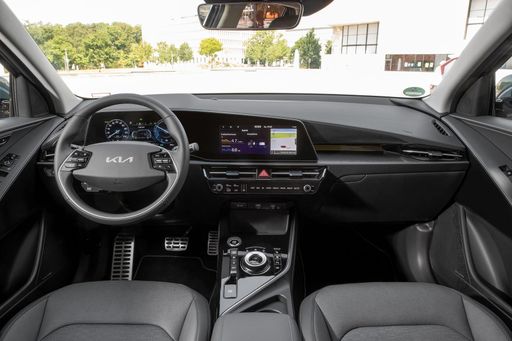 @ press.kia.com
@ press.kia.com
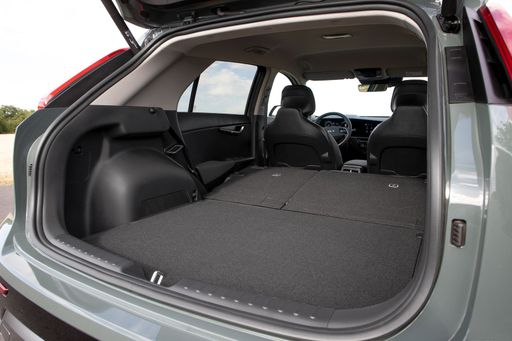 @ press.kia.com
@ press.kia.com
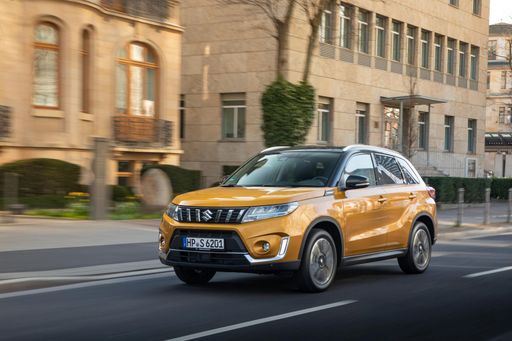 @ Suzuki
@ Suzuki
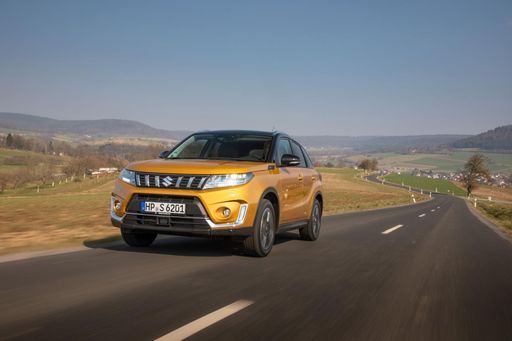 @ Suzuki
@ Suzuki
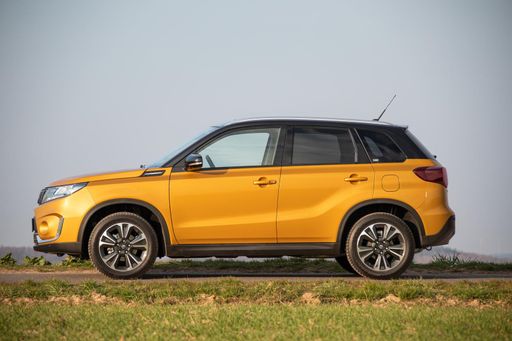 @ Suzuki
@ Suzuki
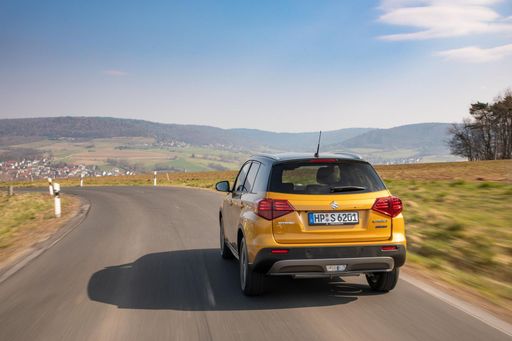 @ Suzuki
@ Suzuki
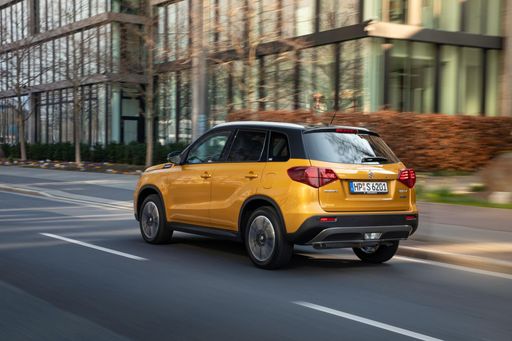 @ Suzuki
@ Suzuki
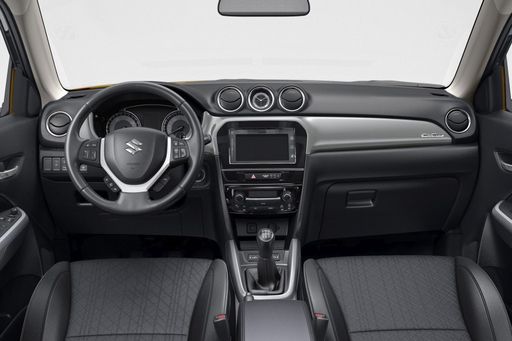 @ Suzuki
@ Suzuki

|

|
|
|
|
Costs and Consumption |
|
|---|---|
|
Price
about 28100 - 37800
£
|
Price
about 23200 - 30400
£
|
|
Consumption L/100km
0.8 - 4.4
L
|
Consumption L/100km
5 - 5.6
L
|
|
Consumption kWh/100km
-
|
Consumption kWh/100km
-
|
|
Electric Range
65
km
|
Electric Range
-
|
|
Battery Capacity
1.3 - 11.1
kWh
|
Battery Capacity
-
|
|
co2
19 - 100
g/km
|
co2
113 - 129
g/km
|
|
Fuel tank capacity
37 - 42
L
|
Fuel tank capacity
47
L
|
Dimensions and Body |
|
|
Body Type
SUV
|
Body Type
SUV
|
|
Seats
5
|
Seats
5
|
|
Doors
5
|
Doors
5
|
|
Curb weight
1474 - 1594
kg
|
Curb weight
1255 - 1395
kg
|
|
Trunk capacity
348 - 451
L
|
Trunk capacity
289 - 375
L
|
|
Length
4420
mm
|
Length
4185
mm
|
|
Width
1825
mm
|
Width
1775
mm
|
|
Height
1545
mm
|
Height
1595
mm
|
|
Payload
466
kg
|
Payload
375 - 395
kg
|
Engine and Performance |
|
|
Engine Type
Full Hybrid, Plugin Hybrid
|
Engine Type
Petrol MHEV, Full Hybrid
|
|
Transmission
Automatic
|
Transmission
Manuel, Automatic
|
|
Transmission Detail
Automat. Schaltgetriebe (Doppelkupplung)
|
Transmission Detail
Manual Gearbox, Automated Manual
|
|
Drive Type
Front-Wheel Drive
|
Drive Type
Front-Wheel Drive, All-Wheel Drive
|
|
Power HP
129 - 171
HP
|
Power HP
116 - 129
HP
|
|
Acceleration 0-100km/h
10.4 - 11.3
s
|
Acceleration 0-100km/h
9.5 - 12.7
s
|
|
Max Speed
160 - 161
km/h
|
Max Speed
180 - 190
km/h
|
|
Torque
265
Nm
|
Torque
235
Nm
|
|
Number of Cylinders
4
|
Number of Cylinders
4
|
|
Power kW
95 - 126
kW
|
Power kW
85 - 95
kW
|
|
Engine capacity
1580
cm3
|
Engine capacity
1373 - 1462
cm3
|
|
Top speed
160 - 161
km/h
|
Top speed
180 - 190
km/h
|
General |
|
|
Model Year
2024
|
Model Year
2024
|
|
CO2 Efficiency Class
C, B
|
CO2 Efficiency Class
D, C
|
|
Brand
Kia
|
Brand
Suzuki
|
Kia Niro
The Evolution of the Kia Niro: A Glimpse into the Future
The Kia Niro has become a symbol of innovation in the hybrid and electric vehicle market. This compact SUV offers a unique blend of efficiency, performance, and style, appealing to a wide range of drivers. Kia Niro's latest model lineup showcases different powertrains, offering consumers choices between full hybrid, plug-in hybrid, and full electric options. These advancements represent Kia's commitment to sustainable mobility and cutting-edge technology.
Performance and Efficiency: Behind the Wheel of the Kia Niro
The performance range of the Kia Niro is impressive, with power outputs ranging from 129 PS in the full hybrid variant to 204 PS in the completely electric version. This ensures that there’s a Niro to meet diverse driving needs and preferences. The acceleration from 0-100 km/h spans between 7.8 to 11.3 seconds across different models, showcasing a balance between efficiency and responsiveness.
Fuel and energy consumption figures are equally commendable. With the hybrid models consuming between 0.8 to 4.4 litres per 100 km and the electric model utilising 16.2 kWh per 100 km, the Kia Niro caters to eco-conscious consumers. Notably, the plug-in hybrid version offers a remarkable electric range of up to 65 km, while the fully electric model boasts an impressive range of 460 km on a single charge.
Innovative Features for Today’s Driver
Kia has equipped the Niro with state-of-the-art features aimed at enhancing the driving experience. The latest models come with advanced driver assistance systems, ensuring safety and convenience. These include lane-keeping assist, adaptive cruise control, and collision avoidance technologies that set a high standard in the compact SUV class.
The Niro also benefits from a sleek infotainment system featuring a high-resolution display, offering seamless connectivity with features like Apple CarPlay and Android Auto. This keeps drivers connected while minimising distractions, creating an optimal driving environment.
Design and Practicality: A Perfect Balance
The Kia Niro stands out with its aerodynamic design, which is both aesthetically pleasing and practical. The dimensions of the vehicle – 4420 mm in length, 1825 mm in width, and a height ranging from 1545 to 1570 mm – provide ample space for passengers and cargo. The boot capacity ranges from 348 to 475 litres, catering to those who require versatility for their lifestyle or family needs.
The Niro’s cabin is crafted with a focus on comfort and usability, incorporating high-quality materials and an intelligent layout that complements its sophisticated exterior.
Sustainability and Cost Efficiency
The Kia Niro reflects Kia's dedication to improving environmental performance. The CO2 emissions spectrum, ranging from 0 to 100 g/km depending on the powertrain, highlights the vehicle's eco-friendly credentials. For those particularly conscious of their environmental footprint, the electric and plug-in hybrid models offer substantial reductions in emissions.
In terms of cost, the Niro offers competitive pricing from €32,790 to €47,590, and operational costs ranging from €928 to €1,101 per month. The Niro also maintains a reasonable cost per kilometre, between 37.1 to 44.1 cents, making it an economically sound choice in the long run.
Conclusion: The Future is Bright for Kia Niro
The Kia Niro stands as a testament to Kia’s innovative spirit and commitment to providing eco-friendly and technologically advanced vehicles. Its blend of performance, efficiency, and innovative features make it a compelling option for those seeking a future-focused SUV. As Kia continues to evolve, the Niro remains a leading example of how the brand is shaping the future of driving.
Suzuki Vitara
Introduction to the Suzuki Vitara: A Blend of Style and Efficiency
The Suzuki Vitara has long been a favourite among fans of compact SUVs, offering a unique combination of style, performance, and technological innovation. The 2024 range continues to build on this strong foundation, presenting drivers with an attractive package that meets modern driving demands with impressive efficiency and capability.
Powertrain Innovations: Efficient Hybrid Options
At the heart of the Suzuki Vitara lineup lies a well-engineered selection of hybrid powertrains designed to cater to a variety of driver preferences. The vehicles are available with both mild-hybrid and full-hybrid systems, which provide a perfect balance between performance and fuel efficiency. The mild-hybrid models feature a 1.4-litre Boosterjet engine, while the full-hybrid variants are powered by a 1.5-litre Dualjet engine. The combination of these engines with hybrid technology results in an impressive fuel consumption range of 5 to 5.6 L/100km.
Performance and Driving Experience
The driving experience offered by the 2024 Suzuki Vitara is enhanced by its powertrain options, delivering between 116 and 129 PS. Depending on the model, the Vitara can achieve a top speed between 180 and 190 km/h and a 0-100 km/h acceleration time ranging from 9.5 to 12.7 seconds. The option of front-wheel or all-wheel drive (ALLGRIP) ensures versatility and adaptability across different terrains, providing superior handling and control, especially in challenging weather conditions.
Advanced Features and Comfort
The Suzuki Vitara doesn't compromise on comfort and advanced features. Depending on the chosen trim level, which includes Club, Comfort, Comfort ALLGRIP, Comfort+, and Comfort+ ALLGRIP, the Vitara is equipped with an array of modern amenities. These trim lines ensure that every driver can find a Vitara that matches their specific needs and preferences. From advanced infotainment systems to climate control options, the Vitara ensures a connected and comfortable driving experience.
Practicality Meets Style
With a body style classified as an SUV, the Suzuki Vitara combines practical space with an aesthetically pleasing design. Measuring 4185 mm in length, 1775 mm in width, and 1595 mm in height, the Vitara offers a substantial interior space with seating for five passengers and a boot capacity ranging from 289 to 375 litres. The thoughtfully designed interior and exterior ensure that practicality does not detract from its stylish appearance.
Efficiency and Cost-Effectiveness
The Suzuki Vitara's efficiency is further highlighted by its competitive CO2 emissions, ranging from 113 to 129 g/km, aligning with CO2 efficiency classes C and D. The cost of ownership is made manageable with monthly costs estimated between €858 and €971, while maintaining economical running with costs per kilometre ranging from 34.3 to 38.9 cents.
Conclusion: A Wise Choice for Today’s Drivers
Overall, the 2024 Suzuki Vitara is a compelling option for those seeking a compact SUV that delivers on performance, efficiency, and modern technology. With its blend of hybrid innovations, practicality, and a range of trim options, the Vitara is well-equipped to meet the diverse needs of contemporary motorists, offering a driving experience that is both enjoyable and sustainable.
